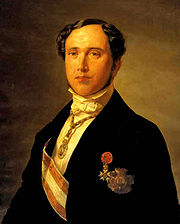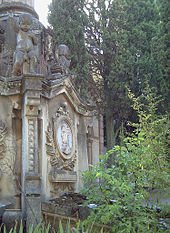- Juan Donoso Cortés
-
Juan Donoso Cortés 
Portrayed with his orders and decorations.Born Juan Donoso Cortés
6 May 1809
Valle de la Serena, SpainDied 3 May 1853 (aged 43)
Paris, FranceOccupation politician, diplomat, writer Nationality Spanish Genres Traditionalism,
Counter-Enlightenment, Ultramontanism
Influences
Influenced- Schmitt, Metternich, Menéndez y Pelayo, Vázquez de Mella, Primo de Rivera, Sorel, Gómez Dávila, Evola
Juan Donoso Cortés, marqués de Valdegamas (May 6, 1809 – May 3, 1853), Spanish author, political theorist, and diplomat, was born at Valle de la Serena (Extremadura). His father, Pedro Donoso Cortés, was a descendant of Hernando Cortés, the conquistador.
Contents
Biography
At the age of eleven, Donoso Cortés had finished his humanities, and at twelve had begun the study of law at the University of Salamanca; at sixteen he received his degree of licentiate from the University of Seville, and at eighteen became professor of literature at the College of Caceres. Carried away by the rationalism prevalent in Spain following upon the French invasions, he ardently embraced the principles of Liberalism and fell under the influence of Jean-Jacques Rousseau, whom he later characterized as "the most eloquent of sophists".
He entered politics as an ardent liberal under the influence of Quintana. His views began to modify after the rising at La Granja, approaching a counter-revolutionary outlook and became more marked on his appointment as private secretary to the Queen Regent. His political thought found its most lucid and orderly expression in his Lecciones de derecho politico (1837).
Alarmed by the proceedings of the French revolutionary party in 1848–1849, Donoso Cortés issued his Ensayo sobre el catolicismo, el liberalismo, y el socialismo considerados en sus principios fundamentales (1851). This work was written at the instance of Louis Veuillot, who was an intimate friend of the author, and places Donoso Cortés in the first rank of Catholic apologists and especially Ultramontanism. It is an exposition of the impotence of all human systems of philosophy to solve the problem of human destiny and of the absolute dependence of humanity upon the Catholic Church for its social and political salvation.
The Ensayo failed to fully arrest the movement against which it was directed, but, it remains amongst the finest specimen of political prose published in Spain during the 19th century.
He became ambassador at Paris, and died there on the 3rd of May 1853.
Donoso Cortés's works were collected in five volumes at Madrid (1854–1855) under the editorship of Gavino Tejado.
Influence
In his Political Theology (1922), political philosopher Carl Schmitt devotes large portions of his final chapter ("On the Counterrevolutionary Philosophy of the State") to Donoso Cortés, praising him for recognizing the importance of the decision and of the concept of sovereignty.[1]
References
 This article incorporates text from a publication now in the public domain: Chisholm, Hugh, ed (1911). Encyclopædia Britannica (11th ed.). Cambridge University Press.
This article incorporates text from a publication now in the public domain: Chisholm, Hugh, ed (1911). Encyclopædia Britannica (11th ed.). Cambridge University Press.External links
Categories:- 1809 births
- 1853 deaths
- People from La Serena, Spain
- Spanish philosophers
- Spanish politicians
- Spanish writers
- Members of the Royal Spanish Academy
- Extremaduran writers
- Ambassadors of Spain
Wikimedia Foundation. 2010.

